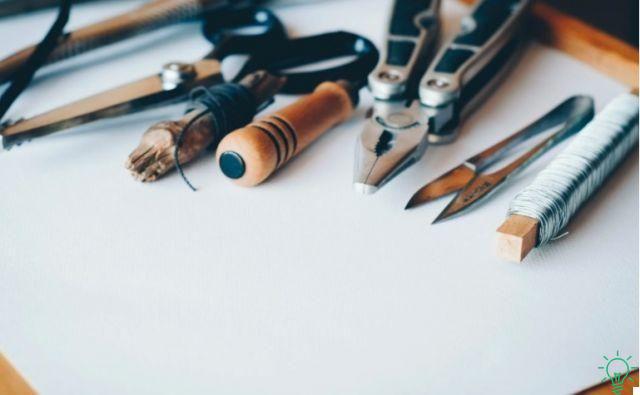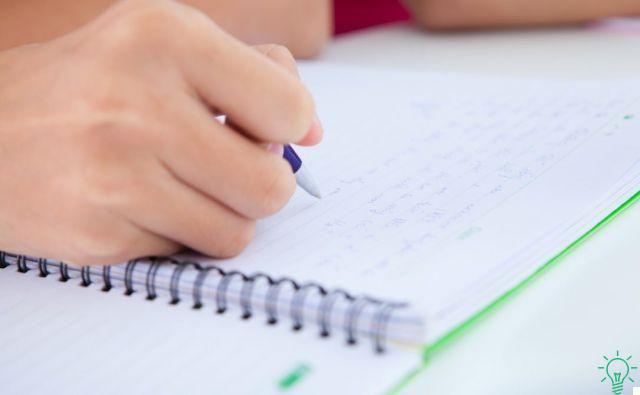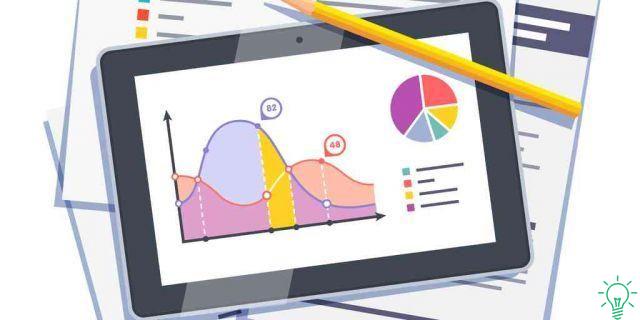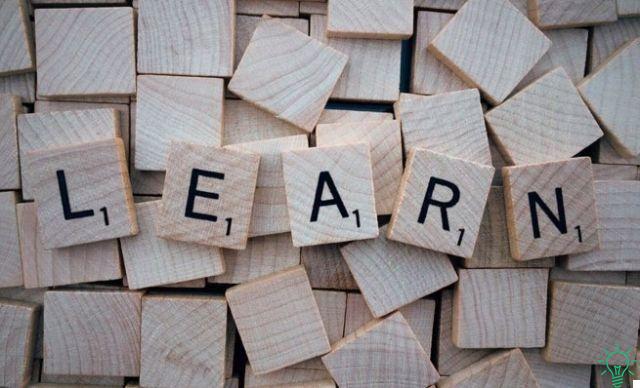
In this long article I want to talk to you about skimming and how to use it when studying.
In fact, many blog readers were amazed at the importance I gave it in this article on the study method, and therefore I thought it was worth explaining why it is so important to me.
I will largely take up some content from my quick-reading book, so if you have already read it it will be a useful refresher, while if you haven't read it, it will be an opportunity to have a first contact with a more sophisticated study methodology.
What is skimming
Let's start with demystifying skimming it: maybe they told you about it as if it were a magical druid practice that gives superpowers, but in reality is quite trivial.
For example, when you read the summary of a book on its back, you are skimming.
As well as when you leaf through the pages looking at the figures.
In short, you do skimming every time you enter a text look for specific items that help you get a general idea of the contents of the text itself, and leave out the others.
These specific elements have a fundamental characteristic: they are more important than the rest.
Maybe this also seems trivial to you, but the reality is that many students read and study as if the information is all on the same level, while this is not the case at all: the information follows the Pareto principle, which is why skimming works so well.
Skimming and the Pareto principle
Skimming means reading a text a little yes and a little no; indeed, a little yes and a lot no, skipping consistent blocks (obviously not by chance, but according to precise strategies that we will see).
For this reason it is a practice that in many students and professors arouses perplexity and questions.
The ones I hear most often are:
- "Isn't it better to read everything?"
- "Isn't there a risk of leaving important concepts on the road?"
- "Isn't it confusing?"
- "Since little is memorized, it is useless"
To answer these doubts, let us return for a moment to the mythical Pareto principle already seen in another post, and that I will summarize you briefly in case you do not know it.
The Pareto principle, or 80/20 principle, it is an empirical rule of efficiency that more or less can be expressed like this:
In nature, 20% of the causes are responsible for 80% of the effects
That is, in any phenomenon or action, not everything has the same weight: some things are much more important than others.
In my opinion it would be enough for humanity to internalize this single rule well to drastically change the fate of the world for the better!
And instead we get lost in the details! Not that they are never important, the fact is that they are not always important.
For example, as I often tell the medical students who follow the blog and write to me, doctors now have extremely sophisticated diagnostic methods at their disposal.
And yet in 80% of cases it is enough for him to know how to do the clinical examination well and request a simple blood test to make a correct diagnosis.
While asking for too many analyzes and exams can even waste time and create enormous confusion.
And even chess champions apply the Pareto principle.
In fact, we tend to think that they play by simultaneously analyzing many different positions, and calculating their development variants up to 20-30 moves forward.
But that's not the case at all!
A series of interviews with the strongest chess players revealed that they do not start calculating hundreds of moves and variations, but they focus each time, thanks to their intuition, on a limited series of them, immediately discarding the others.
And they too, like doctors, often lose games just when they mess up with analyzing and calculating too many things.
Even other activities that are considered very difficult, such as solve the rubik's cube, look different with Pareto eyes!
Maybe you think that to solve the cube you need to analyze and remember lots of data at a time; while in reality, the whole pattern of colored veneers in front of you you have to concentrate, for each move, on only 2-3 of them (I will soon post a video tutorial to solve it on the blog, as this intrigues many readers).
From these observations, and from a thousand other examples of this type, it seems to me that I can say that the fundamental capacity of man's intelligence lies precisely in the ability to exclude a lot of information in order to focus on the few that matterrather than considering them all down to the smallest detail.
Or to put it in a cultured quote:
It is important to remember but more important is to forget.
(Rainer Maria Rilke)
From this point of view for me skimming is not just a reading technique, but a true mental attitude: its purpose is to select what is really important, and to devote less energy to the rest.
It seems strange that I, who am an expert in memorization and study techniques, say this and do it right on this blog.
But you see, I'm not a fundamentalist at all: una thing is knowing how to memorize and theoretically learn anything, another thing is deciding to always do it.
Memory and study techniques are your nuclear weapon for passing exams, but that doesn't mean you have to throw them indiscriminately on any piece of text you see!
Why indeed the human brain works better if it is able to do the “skimming” well, that is to say intuitively select what matters, and leave out what matters least.
Maybe to come back to it later if need be, or maybe even to never go back to it again.
This type of business has a single problem: scares a little because it gives you insecurity.
You would probably prefer to act having considered everything down to the smallest detail, like computers do.
And so even when you study you proceed slowly for fear of not remembering something or to leave out important things.
And like the inexperienced chess player you end up getting lost in a flood of details that you keep forgetting even before you have built the overview of the situation.
To overcome this fear and learn how to skimming you need:
- Experience, because it takes time to understand what to discard and what to focus on
- Reflection, to convince you that this is really the case: not everything has the same importance, and this is a fact in all things!
- A little bit of strategy, that is a few basic rules to start applying skimming to texts.
I leave it to you to reflect on it to see if it really is as I tell you, just as it is yours to practice.
But I can give you a hand on strategies: in fact, skimming correctly does not mean looking at random here and there, skipping what is in the middle, but looking within the text, in an organized and logical way, for precise clues to its content.
Like an investigator!
In this way you do a first processing of the study material not passively, reading line by line while your brain thinks of something else.
But actively, with all your critical faculties well lit, to evaluate what matters and what you can, for the moment, leave out.
So let's see how to start skimming as a good investigator.
Skimming strategy in the studio.
Start with a simple consideration: any text, whether it is didactic or narrative, normally has
- A start, in which the main and general elements of the text are presented in terms of characters, places, ideas, concepts
- One development in which the premises are developed and new elements are introduced
- An end, in which the facts initiated by the two previous parts are summed up or concluded.
For example, a biology book does not normally start with the krebs cycle, but begins by telling you what biology is, or what a cell is.
And so practically almost any text, be it the Divine Comedy or a Physics manual, it does not proceed at random, but follows a logical thread that is divided into three parts (premises - development - conclusion), daughters of an exposition methodology that was born many centuries ago with the Greek philosophers
Now, if you consider the whole complexity of a book, this is of little use: to think that you have read the first and last page of the Divine Comedy and skip everything else, and to pretend to have learned it, is a bit stupid.
So what's the use?
You see, the fact is that this feature "articulated in 3 acts”Has a very important property that I call "Fractality", borrowing the term from mathematics and geometry.
Fractals and skimming
Un fractal it is an object that repeats itself in its form in the same way on different scales, and therefore by enlarging any part of it we obtain a figure similar to the original.
And the beauty is that books, and more generally any informative material, have this property. A book therefore has premises, a development and a conclusion.
But also each chapter has premises, development and conclusion. And also the sub-chapters, as well as the individual paragraphs, and in general almost any sentence with complete meaning.
The rules of skimming are therefore based in the first place on this "fractal" structure.
And then on identifying a number of other very typical repetitive elements.
So, even if they are then better adapted to each course of study, the rules of skimming can be summarized in a series of fairly simple guidelines.
Guidelines for skimming
Based on my experience, here are the main guidelines you need to follow:
- Read the index of the book, trying to grasp the general development that it will have, chapter after chapter.
- Then move on to the body of the book and, starting from the first chapter, read the title and the first and last paragraph. This will give you an idea of where you start and where you are headed.
- Do the same for each chapter
- When you're done, start over from chapter one by rereading its title and first paragraph.
- Continue into chapter one by identifying any subtitles or other divisions.
- Now move on to the paragraphs, reading the first sentence of each of them.
- Find tables, mirrors, summaries, lists, and graphics in general
- Look at the pictures
- Find proper names
- Find and read anything in bold or italics
- Look for words that indicate answers to questions (where, how, why / why, when)
- Finally, completely reread the last paragraph of the chapter.
- If you have doubts about closing, go back one paragraph.
- Move on to the next chapter and repeat the steps for chapter 1 all over again.
While doing all of this, do not try to memorize the details, but focus only on the macro concepts. Memorizing the details will slow you down, and now is not the time to do it.
Even if it is a very "mnemonic" text, don't worry; you will have time to memorize then, and skimming is still worthwhile because it can give you exceptional results in terms of performance in the next study phase.
Because no matter how much you have to memorize in the next step, with skimming you will be able to:
- understand the general development of the arguments (what comes first and what comes after, and why)
- grasp 3-4 main ideas for each chapter
- understand most of the concepts you read
- identify the elements you will need to focus on for subsequent memorization
- passively store part of the content
Obviously, skimming a book in a few hours you will also happen to have missed some important things!
How much it is? Normally not as many as you might think, because like all students you are much smarter than you think.
But there is no need to be afraid, because the study does not end with skimming. Simply start in the best way.
You will have time to deepen and retrieve information in the subsequent phases of the study, which, however, will be much more efficient thanks to the skimming you did in this first phase.
Is skimming difficult?
Look, I'll tell you a story.
A couple of years ago I helped out my 21-year-old cousin for an exam; he wanted to learn memory techniques, but I first wanted to explain skimming to him, putting the book he had to study in his hand.
After 10 minutes he came back telling me he couldn't and it was better to let it go. I would have slapped him if it weren't for the fact that I'm against violence.
And the reason is simple: when you try something new you can't stop after 10 minutes and say it's hard!
You have to give yourself time to internalize it.
So I felt like the Miyagi master in Karate Kid, when he tells the boy to remove and wax the cars.
If it weren't for the kid in the film before telling master Miyagi that he was bullshit, at least he invests us all day!
If you try a study strategy that can save you thousands of hours for a lifetime, isn't it worth investing at least a day before deciding it won't work for you?
So I sat next to my little cousin and we skimmed his book together for almost 5 hours, finishing it all. I think he hated me!
Then I questioned him, and against his own expectations he had learned a lot.
And with each new question I asked him he realized that, even without knowing it well, he was capable of "Orient us", and this enlightened him with amazement more and more.
But be careful, I'm not talking about miracles! In fact, these were general questions, certainly not details.
But he had only started studying for 5 hours. And even if he hadn't learned so many things, he already knew what he was supposed to learn. And how. And where he would find it. And how long it would take more or less to learn.
If he had studied as he always did, after 5 hours he would have found himself at the end of the second chapter, without the faintest idea of what he would encounter in the next 18!
And with a series of details stuck here and there in the mind, with great effort, and that he would forget before he got to the end of chapter four.
It was on that occasion that, with my cousin, we found what I think it is the ideal metaphor to explain what skimming is for:
imagine that, having to cross an unknown forest, you can first fly over it by plane to draw a minimal map of the route, identifying difficult points, paths, water and food resources, dangers, shortcuts.
Don't you think it would be much easier and faster to cross it alive?
Here, this skimming does for you: it helps you draw the map of your exam and study path, and it only takes a few hours to do it.
So back to the original question, skimming itself is not difficult. Unless you just spend ten minutes on it!
However, a mistake that many make. And do you know why?
Because they don't have enough self-confidence to decide what's important and what's not, and therefore in order not to make mistakes they try to see everything, word by word.
What that costs one senormous effort and time, and it also generates a lot of confusion.
Not that you can't even study a whole book word by word, if necessary; the point is, it's not efficient to do it right away.
Now, my cousin was able to make up for the lack of self-confidence because I was sitting next to him. And since then not only has she not given up skimming, but she has also learned many other techniques.
But let's say you don't trust yourself too, how do you solve the problem?
By simply betting 5 hours of your time on your next exam.
In short, do like the karate kid, applying yourself to remove and put the wax for 5 hours without asking questions, and without giving up after 10 minutes.
The worst that can happen to you is that you will have wasted 5 hours.
The best thing is that in the following days, when you start the in-depth study, you too will realize how having the map of the route is quite another thing compared to proceeding step by step without knowing what to expect on the next page.
That's pretty much everything, and if we were to select a single concept from this post, here it is:
Not everything is on the same level. So develop the courage and self-confidence to learn to select what is important.
Start by skimming when you study, and then export it to the rest of your life.
And don't forget, if you know someone interested in skimming, to share this post on facebook: it is important to me because you will please me and help my work.


























